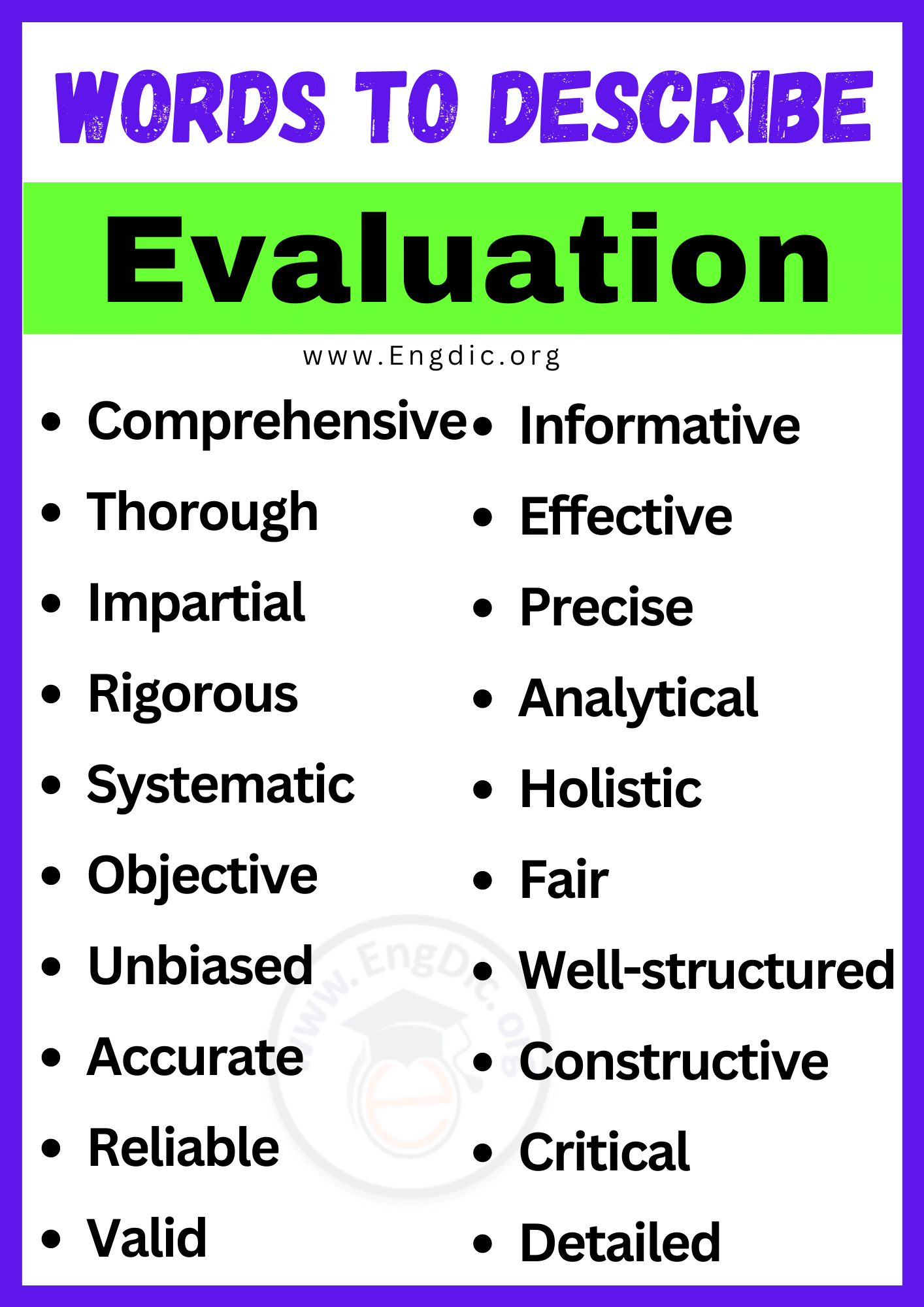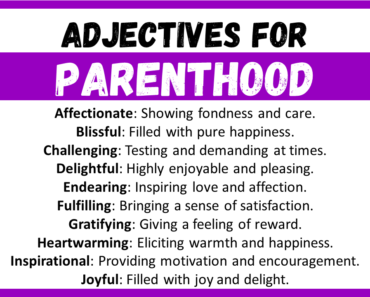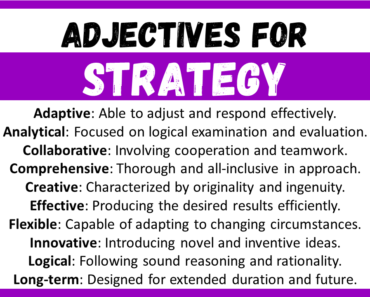Evaluation is the process of carefully examining and assessing something to determine its effectiveness, worth, or quality. When it comes to evaluation, using the right words is crucial to accurately convey our observations and judgments. The words we choose can impact how we perceive and communicate the results of an evaluation.
In this blog post, we will explore the significance of selecting appropriate words to describe evaluation, as they serve as the building blocks of constructive feedback and contribute to making informed decisions in various fields and contexts.
Adjectives for Evaluation
Here are the 20 Most Popular adjectives for evaluation:
- Comprehensive
- Thorough
- Impartial
- Rigorous
- Systematic
- Objective
- Unbiased
- Accurate
- Reliable
- Valid
- Informative
- Effective
- Precise
- Analytical
- Holistic
- Fair
- Well-structured
- Constructive
- Critical
- Detailed
Adjectives for Performance Evaluation:
- Outstanding
- Exemplary
- Satisfactory
- Mediocre
- Inconsistent
- Efficient
- Effective
- Inadequate
- Exceptional
- Improving
Adjectives for Self Evaluation:
- Honest
- Reflective
- Objective
- Critical
- Self-aware
- Analytical
- Constructive
- Insightful
- Thoughtful
- Motivated
Words to Describe Evaluation with Meanings
- Comprehensive: All-inclusive and thorough assessment.
- Thorough: Detailed and complete evaluation.
- Impartial: Unbiased and neutral judgment.
- Rigorous: Precise and exacting examination.
- Systematic: Methodical and organized analysis.
- Objective: Unprejudiced and impartial assessment.
- Unbiased: Impartial and fair evaluation.
- Accurate: Precise and correct judgment.
- Reliable: Trustworthy and dependable assessment.
- Valid: Legitimate and well-founded evaluation.
- Informative: Insightful and informative analysis.
- Effective: Productive and impactful evaluation.
- Precise: Exact and accurate assessment.
- Analytical: Logical and thoughtful examination.
- Holistic: Comprehensive and all-encompassing evaluation.
- Fair: Just and equitable judgment.
- Well-structured: Well-organized and well-planned assessment.
- Constructive: Positive and helpful feedback.
- Critical: Thorough and discerning evaluation.
- Detailed: Elaborate and in-depth examination.
Example Sentences for Evaluation Adjectives
- The comprehensive report covered all aspects.
- Conduct a thorough analysis before deciding.
- Be impartial when evaluating the evidence.
- The experiment requires a rigorous approach.
- Use a systematic method for data collection.
- Ensure an objective viewpoint in assessments.
- The judge was unbiased and fair.
- The measurement was accurate and within limits.
- Rely on reliable sources for information.
- The research findings are valid and significant.
- The presentation was informative and engaging.
- Apply an effective strategy for evaluation.
- Provide precise feedback for improvement.
- An analytical mind is crucial in research.
- The holistic assessment considers all factors.
- Treat all participants with fair consideration.
- Organize a well-structured evaluation process.
- Offer constructive criticism to foster growth.
- A critical evaluation led to improvements.
- The report included detailed recommendations.
Explore More Words:
Adjectives for Feedback |Decision |Strategy
|Ground |Humility |Business |Entrepreneur
FAQ’s
How to describe Evaluation in writing?
When writing about evaluation, focus on the process of assessing, analyzing, or judging the quality, importance, or value of something. You can describe it as a systematic process that involves critical thinking and evidence-based judgments.
In stories or essays, it might be a character evaluating another’s actions, a situation, or themselves. In academic or technical writing, describe it as a methodical approach to determining effectiveness, efficiency, or outcomes.
What is the main purpose of evaluation?
The main purpose of evaluation is to assess the success, effectiveness, or quality of a process, project, or entity to make informed decisions and improvements.
What is the scope of an evaluation?
The scope of an evaluation encompasses the extent and boundaries of what will be assessed, including the specific objectives, criteria, and areas of focus for the evaluation process.








